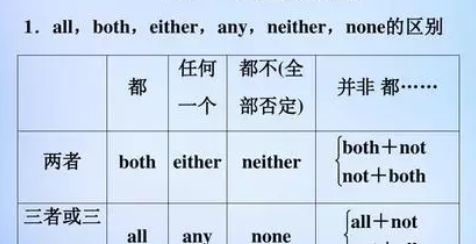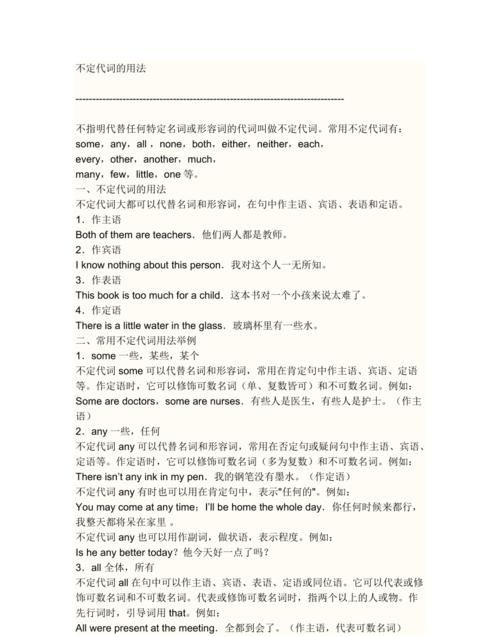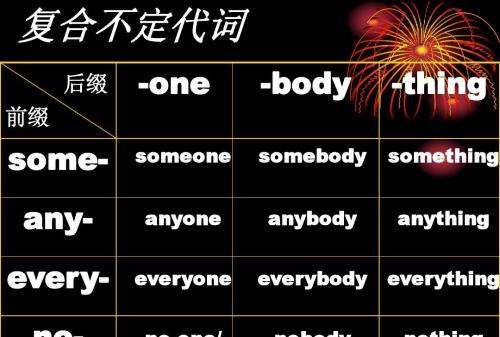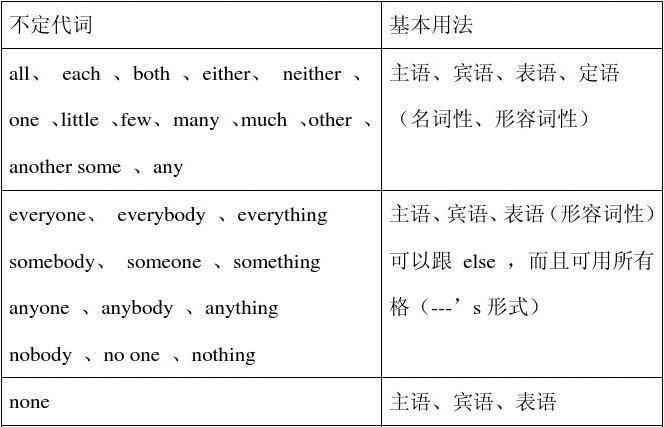本文目录
不定代词的用法口诀
一、不定代词用法口诀:
物主代词分两种,形容词性名词性;形容词性能力差,自己不能来当家;句子当中作定语,身后定把名词加;物主代词名词性,相当名词可单用;句中充当主宾表,身后没有名词影;两种代词形不同,添个 s 形变名;his,its不用变,my变mine要记清。
二、不定代词的用法
不定代词是不指明代替任何特定名词或形容词的代词,英语中不定代词有:some(something,somebody,someone),any(anything,anybody,anyone), no(nothing,
nobody,no one), every(everything,everybody,everyone),all,each,both,much,many,(a)little,(a)few,other(s),another,none,one,either, neither等。

扩展资料:
不定代词any可以代替名词和形容词,常用在否定句或疑问句中作主语、宾语、定语等。作定语时,它可以修饰可数名词(多为复数)和不可数名词。
不定代词any有时也可以用在肯定句中,表示"任何的"。
不定代词any也可以用作副词,做状语,表示程度。
参考资料来源:百度百科-不定代词
不定代词用法总结表格
一、one,some,any的用法
1. one可泛指任何人或物,它还可以用在this,that的后面用来代替前面出现过的可数名词。其复数形式为ones;所有格形式是one’s;反身代词是oneself。如:
One should love one’s country.
These apples are too small. Give me some bigger ones.(ones替代前面的apples)
2. some和any通常用作定语,修饰可数名词或不可数名词。some修饰单数名词时,通常表示不确定的含义,意为“某个”。如:
Some boy is waiting for you now.
3. some用于疑问句中,表示邀请或请求,或希望对方给予肯定的答复。如:
Would you like some tea? (表示邀请)
Can I have some water? (希望得到肯定答复)
二、each和every的用法
1.each强调个别,可在句中充当主语、宾语、定语和同位语。every则强调整体。
2.each可表示两个或两个以上中的“每一个”,而every则要表示三者或三者以上中的“每一个”。如:
There are trees and flowers at each side of the road.
Every student in our class works hard.
三、no one与none的用法
no one 意为“没有人”,只能指人,不可指物。常用于回答who引导的问句。它不可与介词of连用。如:
—Who is in the classroom?
—No one.
none既可指人,也可指物。它强调数量,意为“一点也不,一个也不”。常用于回答how much和how many引导的问句。none还可与介词of连用。与of连用时,通常指“三者以上的人或事物中没有一个”。如:
—How much water is there in the bottle?
—None.
They were all tired, but none of them would stop to have a rest.
四、other和another的用法
1.other表示泛指,意为“另外的、别的、其它的”。常与复数名词或不可数名词连用。如果其前有the,this,some,any,each,every,no,one以及形容词性物主代词时,其后就可接单数名词。注意下面other的几种变形:
others:它是other的复数形式,表示泛指,意为“别的人或物”,但不指全部。如:
Many students are playing on the playground. Some are playing football;others are playing basketball.
the other:表示两者中的另外一个。可单独使用,也可后接单数名词。如:
The old man has two sons. One is a worker,the other is a teacher.
但如果the other后接复数名词或者the other本身用复数形式 (the others),都可表示其余的全部。如:
We shall do some cleaning this afternoon. Group One will clean the wall. Group Two will clean the windows. The other students will sweep the floor.
2. another常用于指三者或三者以上中的“另外一个”。它可单独使用,也可后接名词。如果其后接复数名词,则表示“又、再、还”。如:
This cap is too small for me. Show me another (one).
We need another three assistants in our shop.
五、all和both的用法
这两个词都可表示“都”,但all表示三者或三者以上的人或物,both则表示两个人或物。它们都表示肯定意义,但如果它们与not连用时,则表示部分否定。如:
All of them are middle school students.
His parents are both teachers.
Both of his parents aren’t workers.
All of the students aren’t here on time.
六、neither和either的用法
这两个词都可用于表示两个人或物。neither表示否定意义�意为“(两者中的每一个)都不”;而either则表示肯定意义,意为“(两者中的每一个)都”。它们用作代词时,可单独使用,也可同介词of连用。用作形容词时,则可用于修饰后面的单数名词。如:
Neither of them can speak Chinese.
Either of them can speak Chinese.
There are trees on either side of the street.
There are trees on neither side of the street.
七、few和little的用法
few用作不定代词时,可用于替代可数名词,表示否定意义。表示肯定意义时,则要用a few。 此外,few还可用作形容词,用于修饰可数名词。如:
Few students in this school can speak Japanese.
There are still a few students in the classroom.
little用作不定代词时,用于代替不可数名词,表示否定意义。表示肯定意义时,要用a little。用作形容词时,则要修饰不可数名词。如:
He is now out of work and can earn little money.
I can speak a little French.
从以上讲解我们可以看出,在使用不定代词时,一要注意它们的词性(因为它们还可用作形容词);二要注意它们所表示的数量;三要注意它们是表示肯定还是否定。只有这样,才能用好不定代词。

不定代词的用法
不定代词有:something、somebody、someone、somewhere、anything、anybody、anyone、anywhere、nothing、nobody、no one。
everything、everybody、everyone、everywhere、all、each、both、much、many、a little、a ew、others、another、none、one、either、 neither。
不定代词可以分为很多种类,它的功能与用法也非常丰富,不定代词大都可以代替名词和形容词,在句中作主语、宾语、表语、定语和状语。
不定代词的句法功能
1、作主语
例: Both(of us) are right.
(我们)两人都对。
2、作宾语
例: There is room for all of us.
我们所有的人全坐得下。
3、作表语
例: That’s nothing.
没什么。
4、作定语
例: You may take either road.
两条路你走哪条都行。

扩展资料
1、除every 和no外,不定代词既可用作名词,也可用作形容词。every和no在句中只能作定语.
例如:I have no idea about it.
我没有任何主意。
2、all指三者以上,是“都”的意思。all的单复数由它所修饰或指代的名词的单复数决定。
例如:All goes well.
一切进展得很好。
all 通常不与可数名词单数连用,如:不说 all the book,而说 the whole book.
但all可与表时间的可数名词单数连用,如 all day,all night,all the year;但习惯上不说all hour,all century.
all还可以与一些特殊的单数名词连用,如 all China,all the city,all my life,all the way.
3、both都,指两者。both 与复数动词连用,但 both… and…可与单数名词连用。both,all 都可作同位语,其位置在行为动词前,be 动词之后。如果助动词或情态动词后面的实义动词省去,则位于助动词或情态动词之前。
Who can speak Japanese? We both (all) can.
4、neither两者都不,neither作主语时,谓语动词用单数。
作定语与单数名词连用,但neither… nor 用作并列连词,可与复数名词连用。其谓语采用就近原则。
5、如前句是否定式从句,则主句用neither,而不用 nor。
If you don't do it,neither should I.
如果你不干,我也不干。
6、如后连续有几个否定句式,则用nor,不用neither。
He can't sing,nor dance,nor skate.
7、some 某些,一些,某个
不定代词some可以代替名词和形容词,常用在肯定句中作主语、宾语、定语等。作定语时,它可以修饰可数名词(单、复数皆可)和不可数名词。
例如:some are doctors,some are nurses.
有些人是医生,有些人是护士。
8、any一些,任何
不定代词any可以代替名词和形容词,常用在否定句或疑问句中作主语、宾语、定语等。作定语时,它可以修饰可数名词(多为复数)和不可数名词。
例如:there isn’t any ink in my pen.
我的钢笔没有墨水。(作定语)
9、不定代词any有时也可以用在肯定句中,表示"任何的"。
例如:you may come at any time;I’ll be home the whole day.
你任何时候来都行,我整天都将呆在家里。
10、不定代词any也可以用作副词,做状语,表示程度。
例如:is he any better today?
他今天好一点了吗?
11、none 无人或无
不定代词none的含义和all物相反,和no one,not any同义,但其用法相当于名词,在句子中一般作主语或宾语。它代替不可数名词作主语时,谓语动词用单数形式;代替可数名词作主语时,谓语动词用单、复数皆可。
例如:one of the problems is /are easy to solve.
这些问题没有一个是容易解决的。(作主语, 代替可数名词)
12、each 每个,各自的
不定代词each指每一个人或事物的个别情况,甚至指这些个别情况各不相同。它在句中可以作主语、宾语、定语和同位语。
例如:he gave the children two apples each.
她给了每个小孩两个苹果。(作the children的同位语)
13、every 每个,每一的,一切的
不定代词every有"全体"的意思,和all的意义相近,但只能作定语。
不定代词的用法
不定代词:不指明代替任何特定名词或形容词的代词叫做不定代词。
常见的有:
some, somebody, someone, something, any, anybody,anyone, anything, no, nobody, no one, nothing, all, both, neither, none, either,each, every, everybody, everyone, everything, other, another, much, many, few, a few, little, a little,one等等。
不定代词的功能:
1、 做主语:
Is everybody here?
All is well and ends well.
Nobody else said anything.
2、 做宾语:
I know a little about the novel.
I am speaking for myself, not for others.
Here are two books,you can take either of them.
3、 做表语:
That’s all for today.
It’s too much.
I’m not somebody, I’m nobody.
4、 做定语:
Each book on the shelf is worth reading。
Let me have another cup of tea.
Many people attended the meeting.
5、 做状语:(部分代词)
The film lasted some two hours.
Ts she any better today?
They will come back a little later.
all, ever, each
each,可以指小到两个,all、every 则至少指三个。
all 表所有项目的总和,是一个不可分割的整体。
eg:All the students contributed to the fund.
every 是由各个项目集合而成一个整体,其构成成分有共性。
eg:every child in the class passed the exam.
each 的注意力集中在个别项目上,其构成成分各具特性。
eg:I asked all the children,each told a different story.
注意: 修饰单数可数名词包括集体名词,一般用the whole.
eg:The whole pie was eaten.
The whole class was invited to the party.
some, any
any和some 皆表示不定量,都可接可数和不可数名词。any 多用于疑问句、否定句,有时也用于肯定句;some多用于肯定句,偶尔也用于疑问句。
any
1、Are there any stamps in the drawer?
2、He did not make any mistakes in his spelling.
3、He came without any money。
4、She kissed her brother,but was afraid to ask any questions.
5、We had no idea that any serious losses had been inflicted on the company.
some
Some people are early risers.
The mother is doing some washing now.
I read about it in some book.
Are there some stamps in the drawer?(说话人知道,只是想证实而已)
I do not like some of them.(部分)
Would you like some beer?
everybody, everyone, one
everybody/everyone和every 一样,都含有“各个”的意思,但前者多指所有的人;后者多指说话人所熟悉的人。
everybody/everyone
eg:
Everybody’s business is nobody’s business.
In here everyone is a comrade.
one:泛指人时相当于you,we等。
One does not like to have one’s word doubted.(美语中,常用his 代替 one’s)
no one ,none
no one 仅指人,none 可以指人也可指物。no One= nobody
eg:No one failed the exam.
No one come to see me.
none:
None of the students failed the exam.
None but the lonely heart can know my sorrow heart.
both,two
强调两个人或物时(不止是一个),才用both。
eg:
There were two dogs on the porch.
Both were fast asleep.
The two of them were invited.
Notice will be sent to the two of you.
other,another
other常与复形名词以及单形不可数单词连用分别表示复念和零念。当前面加上“the, this, that, some, any, each, every, no, none, one, or ”以及形容词性物主代词时,表示单念。
eg:
Jones is here,but where are the other boys?
Moral beauty ought to be ranked above all other beauty.
Each member must bring on other person.
She only comes every other day.
I read it in some book or other.
Any other person than her husband would have lost patience with her.
other 有复数形式:others
We should not think only of our own children, there are others to cared for also.
The search party was divided into two groups. some went to the right, others went to the left.
another:表示单念,可数,做定语时后接单形名词或代词one.
Do not say another word.
Where can we find another like her?
This pen does not work i must buy another.
Tell them I am not very well. I will go and see them another day.
注意:another day 指未来,the other day指过去。

以上就是关于不定代词形签名后用法 ,不定代词的用法口诀的全部内容,以及不定代词形签名后用法 的相关内容,希望能够帮到您。
